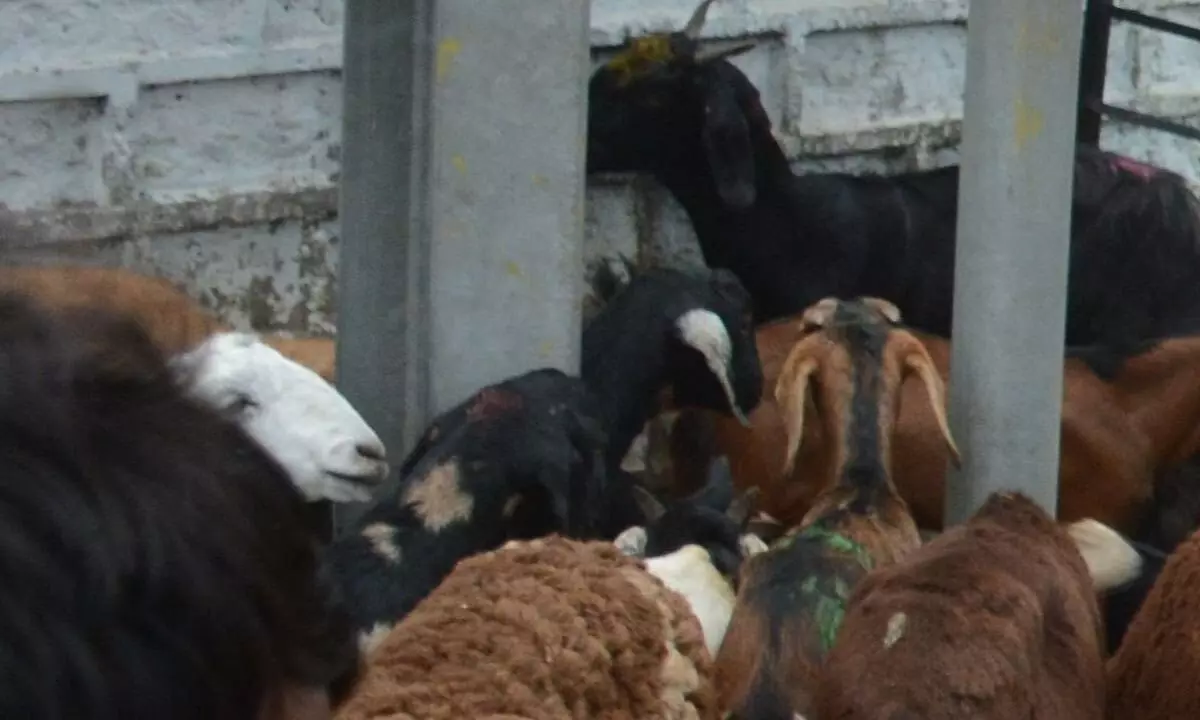Hyderabad braces for Bakrid today; Qurbani outsourcing gains steam

Hyd’bad braces for Bakrid today; Qurbani outsourcing gains steam
- High demand for sheep and goats as Muslims celebrateBakrid (Eid-ul-Adha)
- Growing preference for ‘Qurbani Services’ to handle the entire sacrificial process
- Traders set up stalls across different areas, selling animals at varying prices
Hyderabad: As Bakrid (Eid-ul-Adha) is being celebrated on Thursday, the sheep, and goats are in high demand. Muslims purchased the annual ritual sacrificial animal at higher prices compared to previous years. Moreover, a large number of Muslim families preferred to hand over the task to agencies that provide ‘Qurbani Service.’ They showed interest in the Qurbani services which include buying, sacrifice, arranging their slaughter, cutting and processing the meat, and delivering it to customers at doorstep.
Depending on the size and breed, the traders have set up stalls on roadside in Falaknuma, Chandrayanagutta, Barkas, Malakpet, Chanchalguda, Engine Bowli, Kalapatthar, Bahadurpura, Kishan Bagh, Asif Nagar, Mehdipatnam, Tolichowki, Golconda and some other areas.
In the city, the traders sold a pair of sheep between Rs 28,000 and Rs 30,000. The prices, however, witnessed a decline on the second and third day of Eid. “Every year, it is the same. They increase the prices just before Bakrid. There is a panic buying on the last day,” said Majid Ali, a customer at Jalpally in the city outskirts.
Some traders attribute the rise in prices and low supply of the animals to different factors including increase in transportation costs, and documentation by the authorities. A trader at Tolichowki who had bought livestock from Shadnagar told The Hans India that stringent rules and regulations have been implemented regarding the transportation of livestock into the city. To ensure compliance, individuals are required to obtain all necessary certificates and receipts. Once the animals have undergone thorough examination by the relevant authority, certificates are issued stating whether the animals are deemed fit to be slaughtered or to travel. These measures aim to maintain the quality and safety standards associated with livestock transportation within the city.
The animals sold in city which were brought from local markets like Jalpally, Jiyagudaand other districts like Singichella, Bhongir, Nalgonda, Mahboobnagar, Gadwal, Sangareddy, Zaheerabad, Vikarabad, Tandur, Kurnool etc. and from other states like Karnataka, Maharashtra, Andhra Pradesh, Madhya Pradesh and Uttar Pradesh.
‘Qurbani Service’ gaining momentum. For the last few years, the traders and organisations are not just handling the sacrifice but also making arrangementsfor the slaughter, cutting, processing the meat, and delivering it at doorstep. This has gained popularity during the pandemic. As a result, the e-commerce market gained wide acceptability. Instead of sacrificing the animals on their own, they are outsourcing the entire job to the traders and organisations.
Families are outsourcing the work to the traders and other groups, who not only buy the sheep, goats or cattle for them but also slaughter the animals and deliver the meat at their doorsteps or distribute it among the poor and needy as per their choice.
One of the observers said that people residing in flats in residential complexes and gated communities particularly in mixed-community areas find this practice of surrogate or remote sacrifice as the best option. It allows the smooth performance of a religious ritual without hurting anyone. Some residents of the tradition-bound Old City are also opting for this facility,” felt Mohammed Akhlaq.
“The meat is delivered in boxes at the doorstep and the families directly distribute among their near and dear ones at their own convenience,” says Zeeshan Ahmed, a member of Qurbani Service.
Maulana Mohammed Rizwan Qureshi, Khatib of Mecca Masjid, said “A sacrificial sheep or goat has to be above the age of one year, a sacrificial bull, ox or buffalo has to be above the age of two years, and the animal should be free from obvious defects.”
Muslim clerics and the public representatives appealed to their brethren to dispose of the animal viscera properly to keep the streets clean. “It is our collective responsibility to uphold the Ganga-Jamuna Tehzeeb of our city and maintain peace,” said Hafiz Muzaffar Hussain.











